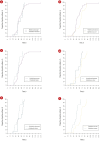Time to Positivity of Blood Culture as a Predictor of Causative Pathogens and Survival in Neonatal Sepsis: A Retrospective Cohort Study from Indonesia
- PMID: 38983906
- PMCID: PMC11231517
- DOI: 10.5001/omj.2024.43
Time to Positivity of Blood Culture as a Predictor of Causative Pathogens and Survival in Neonatal Sepsis: A Retrospective Cohort Study from Indonesia
Abstract
Objectives: In the blood culture procedure for neonatal sepsis, time to positivity (TTP) reflects the pathogenic bacterial load and the time required for empirical antibiotic regimen administration prior to definitive treatment. This study aims to identify the differences in TTP among causative pathogens and its predictive value for the overall survival of neonates with sepsis at a tertiary healthcare center in Indonesia.
Methods: A retrospective cohort study was conducted from January 2020 to August 2022 at Dr. Soetomo General Hospital, Surabaya, Indonesia. Neonates with blood culture-proven neonatal sepsis were included in the analysis. TTP was defined as the time between the acceptance of a blood culture specimen from the neonatal intensive care unit and reports of positive culture growth by the laboratory.
Results: Across 125 cases, the median TTP was 58.1 hours (IQR = 24.48). Blood cultures were positive within 48 hours for 41.6% of cases, 72 hours for 86.4%, and 96 hours for 98.4%. A significantly shorter TTP was exhibited by the three major gram-negative organisms (Klebsiella pneumoniae,Acinetobacter baumannii,Enterobacter cloacae) compared to coagulase-negative Staphylococci. The neonatal sepsis mortality rate was 49.6% during the study period. In the Cox multivariate regression model, a shorter TTP was an independently predicted mortality in the entire cohort (hazard ratio (HR) = 0.985, 95% CI: 0.973-0.998) and the gram-negative sepsis cohort group (HR = 0.983, 95% CI: 0.968-0.999).
Conclusions: TTP predicts different causative pathogens and the overall survival of neonatal sepsis cases at a tertiary healthcare facility in Indonesia.
Keywords: Indonesia; Neonatal Sepsis; Sepsis.
Copyright © 2024, Oman Medical Journal.
Figures



Similar articles
-
Time to positivity (TTP) of neonatal blood cultures: a trend analysis over a decade from Ireland.J Matern Fetal Neonatal Med. 2021 Mar;34(5):780-786. doi: 10.1080/14767058.2019.1617687. Epub 2019 Jul 30. J Matern Fetal Neonatal Med. 2021. PMID: 31072183
-
Factors Associated With Culture-proven Neonatal Sepsis and Resistance to First-line Antibiotics in Indonesia.Pediatr Infect Dis J. 2024 Jan 1;43(1):56-62. doi: 10.1097/INF.0000000000004108. Epub 2023 Nov 16. Pediatr Infect Dis J. 2024. PMID: 37725828
-
Time to positivity of neonatal blood cultures: fast and furious?J Med Microbiol. 2011 Apr;60(Pt 4):446-453. doi: 10.1099/jmm.0.020651-0. Epub 2010 Dec 16. J Med Microbiol. 2011. PMID: 21163823
-
Literature review on the distribution characteristics and antimicrobial resistance of bacterial pathogens in neonatal sepsis.J Matern Fetal Neonatal Med. 2022 Mar;35(5):861-870. doi: 10.1080/14767058.2020.1732342. Epub 2020 Feb 26. J Matern Fetal Neonatal Med. 2022. PMID: 32102584 Review.
-
Gram-negative neonatal sepsis in low- and lower-middle-income countries and WHO empirical antibiotic recommendations: A systematic review and meta-analysis.PLoS Med. 2021 Sep 28;18(9):e1003787. doi: 10.1371/journal.pmed.1003787. eCollection 2021 Sep. PLoS Med. 2021. PMID: 34582466 Free PMC article.
References
-
- Milton R, Gillespie D, Dyer C, Taiyari K, Carvalho MJ, Thomson K, et al. BARNARDS Group . Neonatal sepsis and mortality in low-income and middle-income countries from a facility-based birth cohort: an international multisite prospective observational study. Lancet Glob Health 2022. May;10(5):e661-e672. 10.1016/S2214-109X(22)00043-2 - DOI - PMC - PubMed
LinkOut - more resources
Full Text Sources
